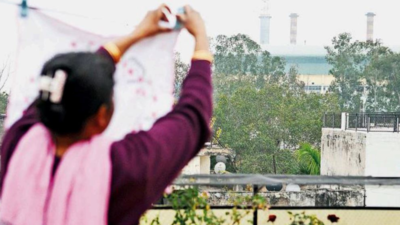Top Searches
- News
- City News
- delhi News
- Delhi: Expert panel denies nod to expand Okhla waste plant
Delhi: Expert panel denies nod to expand Okhla waste plant

The 10-year-old Timarpur-Okhla Waste Management Company, a private company owned by Jindal Group, is currently producing over 20MW electricity by burning municipal solid waste
NEW DELHI: An expert appraisal committee (EAC) constituted by the Union environment ministry has denied expansion permission to the waste-to-energy (WTE) plant in Okhla, while pointing out the shortcomings in its environmental impact assessment (EIA) and taking note of the fact that the plant is very close to residential areas.
The 10-year-old Timarpur-Okhla Waste Management Company, a private company owned by Jindal Group, is currently producing over 20MW electricity by burning municipal solid waste. It sought the permission to produce 40MW by installing additional boilers and, thus, burning additional garbage. However, since the plant is built less than 100 metres from the residential areas, its existence and expansion has been challenged by the residents citing health issues.
The 13-member EAC rejected the plea after considering the EIA draft of the plant and observations submitted by Delhi Pollution Control Committee (DPCC) based on a public hearing on August 16.
EAC, which met on August 24, pointed out that no detailed data had been submitted regarding change in environmental scenario, baseline pollution load, and also suggested that the project should explore alternative sites for the expansion. “No detail about the variations in the use of waste quantity, increase in the pollution load due to the enhancement of capacity, and required environmental infrastructure to handle and mitigate the pollution load due to proposed expansion was provided. No alternative site study has been performed to justify the present proposal,” EAC stated. “Earlier, the ministry has restricted further expansion on the present site as the site is very close to the residential area,” it added.
Stating that the proposal needs to address several observations, EAC pointed out that the current proposal was “premature”. The WTE plant may, however, re-apply for clearance or seek permission at a later stage after ratifying the EIA or adhering to the suggestions by EAC that includes exploring an alternative site.
The draft EIA, earlier submitted to DPCC, had pointed out that the lieutenant governor, too, had asked for the expansion of the plant so that additional 1,000-1,200 tonnes of municipal solid waste could be used to generate power.
EAC suggested that the proposal might be re-examined along with the EIA report. “EAC suggested that the EIA report should contain an alternative site analysis, waste segregation methodology, current as well as the incremental load, including emission data generated during last one year as monitored by CPCB/power plant/municipal corporation, along with detailed justification for the expansion and corresponding environmental safeguard measures,” it asserted.
“Any further expansion beyond 23MW power generation capacity shall not be permitted at the same site, considering the proximity of the Sukhdev Vihar residential colony located at less than 100 metre from the site,” it pointed out.
The colony residents had also pointed out several flaws in the EIA, adding that the plant had been exceeding emission limits of highly toxic dioxins, furans, HCl, PM2.5 etc for which DPCC fined it Rs 5 lakh in September 2021.
The 10-year-old Timarpur-Okhla Waste Management Company, a private company owned by Jindal Group, is currently producing over 20MW electricity by burning municipal solid waste. It sought the permission to produce 40MW by installing additional boilers and, thus, burning additional garbage. However, since the plant is built less than 100 metres from the residential areas, its existence and expansion has been challenged by the residents citing health issues.
The 13-member EAC rejected the plea after considering the EIA draft of the plant and observations submitted by Delhi Pollution Control Committee (DPCC) based on a public hearing on August 16.
EAC, which met on August 24, pointed out that no detailed data had been submitted regarding change in environmental scenario, baseline pollution load, and also suggested that the project should explore alternative sites for the expansion. “No detail about the variations in the use of waste quantity, increase in the pollution load due to the enhancement of capacity, and required environmental infrastructure to handle and mitigate the pollution load due to proposed expansion was provided. No alternative site study has been performed to justify the present proposal,” EAC stated. “Earlier, the ministry has restricted further expansion on the present site as the site is very close to the residential area,” it added.
Stating that the proposal needs to address several observations, EAC pointed out that the current proposal was “premature”. The WTE plant may, however, re-apply for clearance or seek permission at a later stage after ratifying the EIA or adhering to the suggestions by EAC that includes exploring an alternative site.
The draft EIA, earlier submitted to DPCC, had pointed out that the lieutenant governor, too, had asked for the expansion of the plant so that additional 1,000-1,200 tonnes of municipal solid waste could be used to generate power.
EAC suggested that the proposal might be re-examined along with the EIA report. “EAC suggested that the EIA report should contain an alternative site analysis, waste segregation methodology, current as well as the incremental load, including emission data generated during last one year as monitored by CPCB/power plant/municipal corporation, along with detailed justification for the expansion and corresponding environmental safeguard measures,” it asserted.
“Any further expansion beyond 23MW power generation capacity shall not be permitted at the same site, considering the proximity of the Sukhdev Vihar residential colony located at less than 100 metre from the site,” it pointed out.
The colony residents had also pointed out several flaws in the EIA, adding that the plant had been exceeding emission limits of highly toxic dioxins, furans, HCl, PM2.5 etc for which DPCC fined it Rs 5 lakh in September 2021.
FOLLOW US ON SOCIAL MEDIA
FacebookTwitterInstagramKOO APPYOUTUBE
Start a Conversation
end of article









